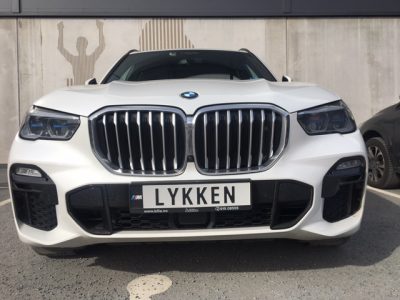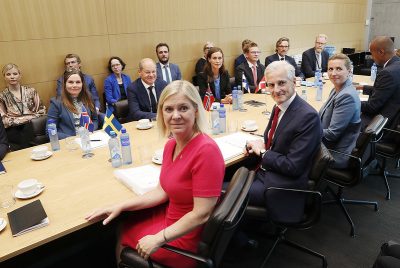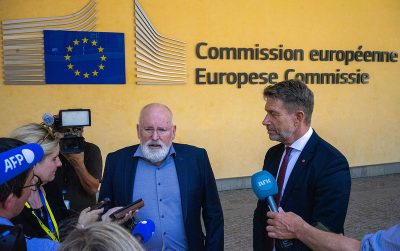NEWS ANALYSIS: Norway’s solidarity with the rest of Europe is being put to the test. At issue is whether Norwegians will continue to export electricity despite record-high bills for it at home, and personally share in its costs after Russia has, as one Oslo newspaper put it this week, “declared an energy war against Europe.”

Norway already has been controversially profiting from Russia’s war on Ukraine, which sent oil and gas prices skyrocketing along with those for other export products like salmon, aluminum, timber and fertilizer. “Here at home revenues from oil and gas have been pouring in … and we’ve had the highest trade surplus we’ve ever had,” wrote economic professor Karen Helene Ulltveit-Moe in newspaper Dagens Næringsliv (DN) last month. Since then, the windfall has continued and most of Norway’s largest companies have reported huge profits as well.
It’s an embarrassment of riches that has prompted Ulltveit-Moe and many others to question Norwegians’ solidarity with the rest of Europe. Even though Norway has donated money and weapons to Ukraine, and continues to send as much gas as it can (at record-high prices), debate keeps raging nationwide over whether to keep exporting some of Norway’s hydro-electric power. “You’d think that in such a situation we’d be more concerned about our neighbours’ challenges and less worried about our own,” Ulltveit-Moe wrote, “but no, it’s our own electricity bills that are getting the most attention.”
Her comments were echoed last week by commentator Lars West Johnsen in newspaper Dagsavisen. “Who are we?” Johnsen wrote. “Have we already forgotten that it was the Swedes who provided us with a place in the EU’s cooperation on acquisition of vaccines during Corona? We were taken under the EU’s wing, in fellowship with hundreds of millions of European citizens. What we do now will form a picture of us for a long time to come.”

While the British fear blackouts this winter and European industry faces shutdowns, Norwegians’ biggest worries now seem to center on heating bills for their businesses, homes and holiday homes in the mountains this winter. Even though the holiday homes are called hytter (literally, huts), the majority today offer all the comforts of home or even more, and consume lots of electricity. Newspaper Aftenposten felt compelled to address the question this week of whether Norwegian hytte-owners should drain the water from outdoor whirlpool hot tubs, since monthly heating bills may surpass NOK 20,000 (USD 2,000).
“Will we be able to use our hytter, or shall they just stand there, suffer frost damage and deterioate?” asked one retired woman in newspaper Dagsavisen on Tuesday. Sissel Solvin wrote in a commentary that not only “affluent or rich people” have hytter, but also many with relatively modest means. She thinks hytte owners, not just households, should also receive state compensation to help cover extraordinarily electricity bills: “Isn’t it our total consumption that means something? We do need better incentives to conserve electricity, but is it logical that the same consumption that moves from one place to another becomes ridiculously expensive because it’s called a ‘hytte?'”
Newspaper DN itself, meanwhile, reported how some hytte owners are “moving” their registered addresses from their primary homes to their holiday homes, which would then enable them to qualify for state compensation. Then their current homes would be classified as a “secondary” home but still eligible for compensation as well. The only snag could be higher fortune tax (called formueskatt) owed at the end of the year on total net worth, because some owners would lose some tax advantages tied to the value of primary homes.
These sorts of concerns grabbing headlines in Norway lately contrast sharply with those of people living in Ukraine, but also in France, Germany, the UK and many other countries that don’t offer anything near the government compensation that’s been offered Norwegians since last winter. In Great Britain, many people are seriously worried they won’t have enough money for food this winter after paying their utility bills, while other Europeans face job losses, power rationing and some very cold months ahead.
Meanwhile, as Aftenposten commentator Kjetil B Alstadheim put it on Tuesday, Russian President Vladimir Putin is increasing what amount to attacks on Europe by cutting off gas shipments. Claims of “technical trouble” and maintenance needs on the Nord Stream 1 pipeline have been dismissed by its producer Siemens Energy. Alstadheim claimed the pipeline shutdown “is only about Putin’s desire to put pressure on European countries, divide them and weaken support to Ukraine.”

Swedish Prime Minister Magdalena Andersson has said much the same, claiming at a press briefing over the weekend that Putin is carrying out an energy war to divide the EU and NATO allies. “We can’t let him succeed,” she added. She also warned that the energy crisis can lead to a finance crisis, prompting Sweden and Finland to provide state loan guarantees to the energy sector from which Norwegian energy firms could also benefit. Sweden is also imposing new measures to cut power consumption.
Splits may still occur, however, if Norwegians and others don’t drastically reduce their own consumption and if Norwegian politicians bow to public pressure to lower electricity bills by reducing exports. Norway has been more than willing to export as much gas as possible to Europe, but there’s not a big consumer market for it at home. Norwegians have traditionally heated their buildings with electricity or fireplaces, so they don’t suffer much from any reduction of gas supplies at home. Sales of the gas produced from Norway’s offshore fields are also commanding extremely high prices.
Norwegians can “suffer” in terms of high and rising monthly electricity bills, though, if Norway’s hydroelectricity is exported at a time of record low water levels in Norwegian reservoirs. A government proposal to limit exports if the water levels fall even further has been met with protests, with one energy official in Finland telling the Financial Times that Norway’s plan amounted to “very egotistical behaviour.”
Alstadheim has suggested, meanwhile, that it may be best if the concerns of hytte owners in Norway aren’t made known elsewhere in Europe, since they pale in comparison with the much more serious worries of other Europeans.
Norway’s historic ability to profit on various crises continued this week with more news of record seafood exports, up 54 percent in August to NOK 12.5 billion. The country’s economy has remained strong, and rebounded quickly from the Corona crisis. Large companies from oil and energy giant Equinor and fertilizer maker Yara to metals producer Norsk Hydro and Norway’s biggest bank DNB have reported huge quarterly profits recently. Share prices fell on widespread market uncertainty on Tuesday, but Norway is expected to report more huge trade surpluses like the one tied to record-high exports of NOK 229 billion in July.
Housing prices also rose again last month, defying predictions that rising interest rates would cool the market. Not so: Parents with lots of equity in their own homes continue to help the next generation break into the still-hot real estate market, while low unemployment keeps the job market solid for home-buyers with big mortgages. Norwegians in general seem to have more money, with savings accounts also swelling during the pandemic and many “preparing themselves” for possibly tougher times ahead, according to Snorre Storset of banking firm Nordea in Norway.
Espen Barth Eide of the Labour Party, a former foreign- and defense minister who’s now Norway’s Climate and Environment Minister, admitted as early as last spring that the enormous amounts of oil, gas and other revenues pouring into Norway were creating “an absurd situation.” He told DN just a few weeks after Putin’s invasion of Ukraine that while the war was terrible for the world, it was a “win-win situation on all fronts” for Norway. Eide urged investing most of the billions in the so-called “green shift” to more climate friendly industry. Instead Norway’s oil and gas business is pumping as never before to meet demand.

Oil & Energy Minister Terje Lien Aasland, meanwhile, rejects complaints of “energy nationalism” that have rolled in from analysts and both EU and Nordic allies in recent weeks. They’ve warned Aasland and the rest of the Norwegian government against limiting electricity exports, for example, but Aasland claims Norway is in its full right to do so if needed to protect Norway’s own energy security.
‘Not nationalistic’
“Energy cooperation is important and we are absolutely not nationalistic,” Aasland told DN over the weekend. “We have contributed considerably to Europe energy security by being able to export more gas in the course of this year.” He claims that hanging on to Norway’s electricity when reservoir levels are low is important. Aasland denies Norway risks violating any of its trade agreements with the EU if it limits electricity exports to secure Norway’s own needs.
The extent of those “needs,” however, is debatable, if they continue to include the use of lots of electricity for such amenities as outdoor spas, heating cables in driveways to melt snow and ice, or to heat large homes with thermometers set at over 20C. If European neighbours start freezing this winter, they won’t take kindly to how the good life in Norway may proceed unabated. Electricity sent from Norway to the UK may be especially important in the months ahead. Norway’s own energy authority NVE has concluded that Norway can limit electricity exports to ensure security of its own supplies, but not simply to lower monthly bills.
On Monday came news that Norway and Sweden will gather the Nordic and Baltic countries in a group aimed at strengthening all of the countries’ energy security. “Stability and security in Europe hinges on energy,” Aasland told Norwegian Broadcasting (NRK). Suddenly he was the one saying that “Putin is trying to split us on the energy issues. He will not succeed with that. We will cooperate and tear Putin away from the weapon he’s sitting on and the war he’s conducting against European countries.”
Aasland also promoted use of the cables that send electricity abroad and also to Norway if needed. In a lengthy televised debate with conservative investor Øystein Stray Spetalen on NRK Tuesday evening, Aasland rejected Spetalen’s claims that Norwegians have already given up control over “their own energy” and subjugated themselves to the EU through misguided energy policy. Spetalen retorted that electricity rates have “nothing to do with solidarity” with the rest of Europe because Europe receives very little of its electricity from Norway. He accused the government of “blaming the high rates on Putin, Ukraine and (European) fellowship,” while he claims the high rates are a result of policy changes that have subjected Norway to a market that’s dragged Norwegians into European price levels.
Consumption concerns
The high prices are prompting Norwegians to realize they probably should cut their own electricity consumption. “I think people are ready for measures to help them live in a more sustainable manner,” Karoline Andaur, secretary general of WWF in Norway, told Dagsavisen, while the Greens Party has criticized the government for using much more money on electricity bill compensation than on incentives to conserve electricity.
The challenge is simply that electricity had been bountiful and cheap in Norway ever since its first hydroelectric plants were built more than 100 years ago. It take times to change the mindset, and even Putin’s invasion of Ukraine didn’t spark immediate reaction. “In Norway it seems to be a fundamental human right to rank at the top of electricity consumption per capita,” wrote Aftenposten commentator Halvor Hegtun when the rumbling over Norwegian selfishness started getting louder. “It’s not supposed to cost so much here, in a land with so many waterfalls and power plants, and such long and cold winters.” While everything else in Norway is viewed as expensive, electricity was supposed to remain cheap, at least according to Spetalen.
It’s not any longer, and Hegtun noted that the price of it now has a lot to do with a deeply tragic war that sent energy prices skyrocketing both in Norway and abroad. It’s time, he and other commentators believe, for Norwegians to be more generous and recognize there’s a price attached to the war that they also need to pay.
“It’s exactly a tough winter and spring that Putin wants,” wrote Alstadheim in Aftenposten. “The next few months will be a test of solidarity and cooperation among countries, a test of countries’ ability to take care of those hit hardest.” He warned of “extreme challenges” to the European economy and how important it is to meet them.
Other commentators agree: “Putin has declared an energy war against Europe,” editorialized DN on Tuesday. “Russia is trying to pressure Europe into withdrawing support for Ukraine’s defense against Putin’s invasion. It’s important we don’t give in.” DN supported the energy policy and system “that worked well for many years and has been sabotaged by Putin.”
Norway, as an energy nation, “must do what we can to be part of the solution to the problems Putin has created,” DN continued. “This is not the time to create distance between the EU and us in our energy policy. That’s something some players in the Norwegian energy debate should think about.”
NewsinEnglish.no/Nina Berglund

